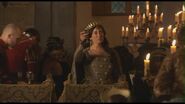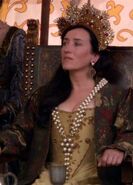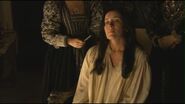"As long as I am alive, I will call myself 'the Queen of England." -Catherine of Aragon
Catherine of Aragon was the first wife and Queen Consort of Henry VIII, and the mother of Princess Mary Tudor. She appears in Season 1, Season 2 and the finale episode of Season 4 in 16 episodes total; she is portrayed by award-winning Irish actress Maria Doyle Kennedy.
Catherine is a direct descendant of the Spanish royal line, the youngest daughter of Queen Isabella of Castille and King Ferdinand of Aragon. Crowned in 1509 before her marriage to Henry was annulled in 1533, Catherine was a devoted wife and mother and a pious Catholic. Henry's obsession with the beautiful Anne Boleyn was ultimately what destroyed his marriage to Catherine. After a long and hard struggle, Catherine is eventually sent away from court to live, lonely and desolate, and banned from seeing her beloved daughter, Mary. Her only friend in reach is Elizabeth Darrow, her devoted maiden who refuses to leave Catherine.
During their marriage, Catherine is cheated on by Henry many times, his infidelities resulting in a son by Catherine's maid, Bessie Blount. Despite this, Catherine maintains her intense love for Henry and never calls him out on it until he actually attempts to divorce her. She confides to her maiden early in the first season that Henry blames her for being unable to produce a son. Catherine is devoted to her Catholicism above all else, with the exceptions of husband Henry and daughter Mary.
In late season two, not long before Henry becomes infatuated with Jane Seymour, Catherine becomes sick and succumbs to her illness. She has hallucinations of Mary and is supported by Elizabeth Darrell. Shortly before her death, Catherine writes Henry a letter pledging her forgiveness and praying for his soul. Henry tearfully reads the letter, while Anne Boleyn is unfazed and simply states that now she is finally queen. Mary is devastated, collecting a box of her mother's things. Mary comes to love her father's third wife, Jane Seymour, but never forgets her mother. Catherine remains Queen of England in the nation's eyes.
Season One
Early in the first season Catherine is introduced. Very much in love with the philandering King who also happens to be her husband, she is an extremely well-loved queen, adored by the nation, who is not only a dutiful wife but mother also. She is forced to endure the hardship of being unable to give Henry a son when he gets her maiden, Bessie Blount, pregnant. She confides in Bessie that Henry blames her for not giving him a son. Many more infidelities follow, but Catherine's affection for Henry is unwavering.
Henry's illegitimate son Henry Fitzroy is born out of wedlock, and to Catherine's jealousy and anger, he shows his bastard son more favor over his legitimate daughter Mary Tudor. She increasingly blames Cardinal Wolsey for her separation from her daughter and for Henry's cruelty towards her, incorrectly thinking he is manipulating the King. After meeting Anne Boleyn, Henry becomes infatuated with her, as his conscience is affected by the fact that Catherine was married to his deceased brother, Arthur. Catherine, however, pledges that she never slept with Arthur and was thus a virgin when she married Henry. Henry chases Anne Boleyn, unable to shake his desire for her, until she gives in.
Shortly after giving his son Henry Fitzroy many titles and lands, Henry comes to Catherine's chambers and is happily greeted by his loving wife. However, Henry bears the news that he is divorcing her. He leaves, choking on his words. Catherine sinks to the floor and cries, devastated.
The whole of England continues to love and respect Catherine, despite her fall from Henry's favour. She has strong supporters abroad in Spain, Rome and the Holy Roman Empire as well as England itself; Sir Thomas More and Bishop John Fisher of Rochester remain her devoted friends. There comes to be tension between the queen and Anne Boleyn, who firmly states her belief in Henry's love for her. Catherine shuts this down and is sure Henry will choose her over Anne, but she is soon proven wrong, even though she dismisses Anne from her entourage in episode 1.06. In 1.07, she is sent by Henry to join their daughter Mary at Ludlow Castle in Wales, to keep them safe from the outbreak of sweating sickness. Despite her popularity, Catherine has few powerful allies at court except Inigo Lopez de Mendoza, the ambassador to her nephew Charles V, the King of Spain and Holy Roman Emperor. She pleads for Mendoza to alert Charles to Henry's attempts to divorce her, since he holds the Pope (the only one who can decide if the marriage may be annulled) hostage after sacking Rome in 1.05.
Catherine does win a significant moral victory near the end of the season, when an ecclesiastical court headed by Cardinal Wolsey attempts to justify the King's desire for a divorce. The Pope's representative, Cardinal Compeggio, had already heard Catherine's confession (that she had married Henry a virgin despite having briefly wedded his brother first) and Bishop Fisher argued gamely in her defense, supported by Catherine's own impassioned testimony. Compeggio suspended the hearing until October when it would be resumed in Rome, effectively deciding in Catherine's favor, and she left the court to the cheers of the people. Wolsey attempts to browbeat her into submission, but Catherine refuses to be intimidated, knowing that as long as she continues to thwart Wolsey she endangers his standing with Henry, which he is effectively dependent on for survival.
However, once Cardinal Wolsey was deposed near the end of the series, the Boleyn family began to rise in court, advocating for the displacement of Catherine. Anne Boleyn, now Henry's mistress, urges him to reform the Church so that he can make his own annulment. Catherine also loses her ally Mendoza when he is recalled to Spain, though he assures her that his replacement—Ambassador Eustace Chapuys—will fight for her just as fiercely. Catherine is offered an alliance by her now-disgraced rival Wolsey in the season finale, but their communication is intercepted and Wolsey is arrested for treason before she can accept.
Season Two
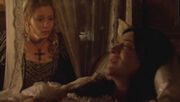
Catherine dictates her will despite suffering from her illness
Catherine remains at court for the start of the second season. She continues to make Henry's shirts, unknowingly having deeply offended Anne. When Anne spots someone carrying linen to the Queen for this purpose, she persuades Henry to banish Catherine to the Manor of the More where she would live out the rest of her days in exile and increasing poverty; Anne takes over most of her estates and property. Catherine obeys, but proudly refuses to return her royal jewels or renounce her title as Queen. Sir Thomas More and Ambassador Eustace Chapuys continue to visit her when they can, but John Fisher is unable to as he is first weakened by a poisoning attempt and is later put under house arrest. Catherine tells Chapuys to send her nephew the Emperor a message, pleading with him not to use military force against Henry or England on her behalf, saying it would be a sin. Chapuys, who deeply admires Catherine also smuggles an occasional letter between the exiled Queen and her daughter.
By episode 2.03 the clergy in England have mostly submitted to Henry, and the new Archbishop of Canterbury Thomas Cranmer declares Henry's marriage to Catherine null and void, while declaring his recent marriage to Anne legal. Charles Brandon—visibly pained, since he deeply admires Catherine's courage—is forced to deliver this news to Catherine during the episode, as well as telling her the King will no longer acknowledge her. Pained by unbroken, Catherine continues to recognize herself as the Queen. While most Catholic countries continue to recognize Catherine as the Queen, Anne's coronation in England means she must accept the title of Dowager Princess (since she is the daughter of a King and was briefly married to Henry's brother).
In Episode 2.04 Henry receives a letter from Catherine (brought by Chapuys) pleading for him to let her tend to Mary, who is ill. Henry sends his royal physician to see Mary but adamantly refuses to let mother and daughter see each other; knowing Catherine's charismatic and brave personality, he fears (probably influenced by Anne) that she would conspire against him to restore Mary to the throne through force, despite the absurdity of this suggestion. She is forbidden to see her daughter, but Chapuys and Thomas More continue to help her as best they can, although More is imprisoned at the end of 2.04. However, by episode 2.05 her health is declining rapidly despite the loving care of her remaining handmaidens.
Catherine dictates her will to her handmaidens on her deathbed, pleading with Henry to show mercy to their daughter Mary. Moments before her death in episode 2.07, Catherine hallucinates that she is visited by her daughter, Mary. Her handmaidens are so heartbroken by her death that one of them, Elizabeth, commits suicide. Meanwhile, Mary clutches a box of her mother's things, and cries, devastated by her mother's death.
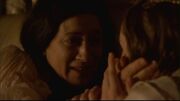
Catherine hallucinates that she is visited by her daughter, Mary, and they embrace
The court seems unaffected by Catherine's demise despite the popularity she endured as Queen, although Catholic commonfolk display mourning for her. Henry is stricken when he receives her will and weeps (perhaps for the sake of the true love they formerly had) but Anne Boleyn receives the news calmly, remarking to herself, "And now... I am indeed Queen." Episode 2.07 marks the last live appearance of Catherine. She appears again, but as a ghost in a dream sequence in the fourth season, most likely created from Henry's guilt. Catherine's season two appearances occur from 1532–1536. Strangely, she dies the same year that Anne is executed, only months before.
Season 4
Catherine has a brief appearance in the final episode of the series, in the fourth season. She appears to reprimand Henry, who is plagued by guilt over his treatment of all his wives and their children. Mary also appears in the sequence with her mother, and Catherine berates Henry for his poor treatment of their daughter, lamenting that Mary has neither a husband or children of her own. Henry feebly tells her to go away, calling her a 'shade' but Catherine cooly replies, "You sent me away before, even though I loved you. But I was still your wife, in God's eyes- and still am." Catherine is briefly seen during Henry's flashback sequence in the final scene, watching Henry hugging a much-younger Mary.
Quotes
- "If I had to choose between extreme happiness and extreme sorrow, I would always choose sorrow, for when you are happy, you forget about spiritual things, you forget about God. But in your sorrow, He is always with you."
- "Sir I beseech you. For all the love that has been between us. Let me have justice and right. Give me some pity and compassion for I am a poor woman and a stranger born out of your dominion. I have no friend here, and little counsel. I plea to you as head of justice in this realm. I call God and all the world to witness that I have been to you a true humble and obedient wife ever compliant to your will and pleasure. I have loved all those whom you have loved for your sake whether or not I had cause. Whether they be friends or enemies. By me you have had many children. Although it has pleased God to call them from this world. But when you had me at first,I take God as my judge, I was a true maid without a touch of man. And whether or not it be true, I put it to your conscience."
- Catherine: "That necklace—who gave it to you? (Anne remains silent) Answer me." Anne Boleyn: "His Majesty." (Catherine lifts the pendant to examine it) Catherine: "Expensive, eh? (in Spanish, to herself) {An expensive whore}." Anne Boleyn: "I am no whore, Your Majesty. (Catherine looks startled and angry that Anne understood her and spoke back) I love His Majesty; I believe he loves me." Catherine: (laughs mockingly) "He's infatuated with you, as men often are by new things. Soon, he will see you for what you really are—and he will tire of you, as he has of all the others." Anne Boleyn: "... And, what if he does not?" Catherine: "I did not give you permission to speak! You are a servant! (Anne lowers her gaze) Leave, now!" (Anne gets up and leaves, Catherine stares after her in anger and fear)
- "I was still your wife in God's eyes and still am."
- "You dare speak to me of chastity?! Have you not a mistress and two children, your Eminence?!" - to Cardinal Wolsey
- "This court has no meaning to me, therefore I will not stay here."
- (In Spanish, to Mary Tudor) "Be strong, my daughter. Remember who you are: the descendant of Isabella and Ferdinand of Castille, and the only daughter of the King of England. Be strong and be true, and one day... one day you will be Queen."
- "I have nothing against His Majesty, whom I love with all my being—only against his advisors, and a certain... woman whose ambition would ruin the kingdom."
- "Poor Bishop Fisher... he was a lion in my defense."
Physical Appearance
Catherine has long black hair, an olive complexion and eyes of a green and blue colour, although in real life she apparently had red hair. She stands at 5′ 6″ in the series. She is said to have been attractive in her youth. In 1519, Francis I reportedly said that Henry was "young and handsome" and that Catherine was "old and deformed". Catherine, however, was in fact under five foot in height and overweight. At 51, Catherine was most likely not as attractive as she might have been at a younger age, especially after repeated childbirth, six times; however, she still had a noble and dignified bearing.
Personality and History
Well-educated and well-versed in the world of royal politics, Catherine was also a very religious woman, and she often went to church and prayed. She was a very loving person, adoring her unfaithful, spoiled, and bad-tempered husband Henry who clearly did not love Catherine as much as she loved him. Catherine took great pain in not seeing her beloved daughter Mary for four years, and even had a hallucination of Mary while she was isolated from court. Catherine was graceful and kind, which made her a popular queen and earned a fair amount of hatred for Anne Boleyn when she was displaced. Catherine was one of Henry's most popular queens, and a queen of her popularity was not shown again until Henry wed Jane Seymour, his third wife who was nearly as popular as Catherine. Even Catherine's Protestant opponents, such as Thomas Cromwell, admired and respected her dedication, and she had few real enemies; the main exceptions were Cardinal Thomas Wolsey and Anne Boleyn (plus Anne's ruthless father and brother) Catherine often stressed and suffered about not giving Henry a son, praying to Jesus to have a male child. However, Catherine's extreme love for Henry often blinded her to the wrongness of his infidelity and made her weak against his demands. This passive nature, distorted by her love for her indifferent husband, made her unable to stand up to the few enemies that she had, despite her immense rank. When Anne Boleyn, while still her lady-in-waiting, openly contradicted her remark that the king would pass her over as a lover, Catherine was visibly very angry, but she did nothing more than order Anne from the room. She seemed visibly afraid of Anne despite the latter's lack of political power and experience, probably because Anne was her intellectual equal and had a more alluring style than she did. Had their positions been reversed at the time of the argument, Anne would probably have had her beheaded; there was never anything restrained about her hatred for Catherine once she came into Henry's favor.
She was a solemn woman who educated her daughter Mary right, telling her, "One day you will be queen." Catherine was noticeably hurt by Henry's infidelity, telling Elizabeth Blount of her suffering that Henry couldn't understand. However, Catherine handled Henry's affairs surprisingly well, much like Jane Seymour. Catherine never loved Henry any less for his infidelity, and she never saw it as a problem except when Henry got Elizabeth Blount pregnant and placed their son above Princess Mary Tudor. This obviously angered and surprised Catherine, who, in episode 5, declared: "I cannot believe he wishes to place his bastard child above her!" Catherine's devotion to God was very evident (something she passed on to Mary) and she stated several times that if she could choose great happiness or great sorrow, she would always choose great sorrow, because in great happiness "You forget the Lord." Catherine was beloved by the people, earning many cheers and shouts whenever she paraded or walked the streets, often performing generous acts of charity on behalf of both the church and the royal family. She disliked Thomas Wolsey, which was evident from the early episodes.
Catherine's devotion to her husband and her Catholic faith in the face of her loss of power earned her sympathy and admirers across Europe, even from Martin Luther (ironically, the greatest critic of the Catholic Church of that time period).
Relationships
Henry Tudor
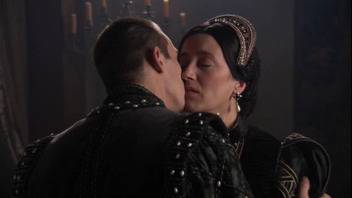
Catherine and Henry
Henry was Catherine's second husband, and the love of her life. The two had a loving, caring relationship until their marriage went sour over the years with her failure to deliver a surviving male heir, and relations got worse when Henry was taken with the beautiful Anne Boleyn. Catherine loved Henry deeply, and her unwavering affection for Henry was where her stubborn side arose when she refused to divorce him. In the first season, Catherine stated she would put Henry's life before hers. Catherine became somewhat of an unwanted nuisance in Henry's life after he began a relationship with Anne Boleyn. Despite their seemingly happy marriage at first, Henry often womanized and slept with many other women. His wife was distraught to discover that he had gotten Bessie Blount pregnant, and many more infidelities followed. However, she never confronted him, directly, of his infidelities, (except for Anne Boleyn, whom he planned to make queen in place of Catherine) and during the celebration of the birth of his illegitimate son, the queen respectfully raised a glass to Henry. As the series progressed, Henry became crueller to Catherine, banning her from seeing their daughter and isolating her, banishing her from court. Despite the unpleasant conditions she endured near the end of her life, her love for Henry never wavered and her final letter to him before her death wrote that she forgave him for his actions against her.
Mary Tudor

Catherine and Mary
Mary was Catherine's daughter. Catherine was deeply devoted to Mary above all things, with the exception of her husband. The two had a mutual love and respect for each other, and Catherine missed her daughter terribly when she was banned from seeing her. She missed Mary so much that she eventually hallucinated that Mary visited when she died. Catherine nurtured Mary from a young girl to a woman, and expressed concern when she discovered her daughter was ill.






